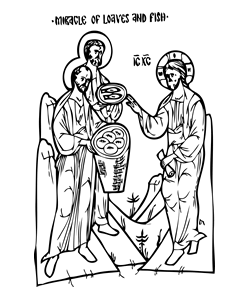|
|||
|---|---|---|---|
| This weekly bulletin insert complements the curriculum published by the Department of Christian Education of the Orthodox Church in America. This and many other Christian Education resources are available at http://dce.oca.org. | |||

In Matthew 16: 1-12 Jesus Christ talks about signs with some Jewish challengers, and then with His disciples. The Pharisees and Sadducees throw down their challenge by asking that He show them a sign from heaven. They want a spectacle—one amazing enough to prove that He is what He claims to be. Jesus reminds them that they are competent at interpreting the signs the sky gives. They anticipate good weather if the evening sky is red, and look for stormy weather if the morning sky is threatening. Yet, He says, they fail to interpret the "signs of the times" They don't acknowledge the clear signs He has shown them: the great crowds who have brought "the lame, the maimed, the blind, the dumb and many others" to Him and have seen all these people miraculously healed. Nor are the healings the only signs, for Jesus has also inspired faith in those who witnessed them; we read that these witnesses "glorified the God of Israel." The challengers are an "adulterous" generation, He tells them, because they have broken the covenant with God that is like the marriage bond. He says that such a generation, seeking signs, will not receive any other than the sign of Jonah—a reference to His three days in the tomb, like Jonah in the belly of the whale. It's also a reference to the greatest sign: the Resurrection. The apostles, though of course not hostile to Jesus like the Pharisees and Sadducees, seem equally poor at remembering the signs He has shown them. He says, "Take heed and beware of the leaven of the Pharisees and Sadducees." He means that they must avoid the wrong teachings of those men. But the disciples, who have forgotten to bring bread, relate it to their oversight. Jesus must remind them: "Do you not remember the five loaves of the five thousand, and how many baskets you gathered? How is it that you fail to perceive that I did not speak about bread?" Saint Apollonarius was a follower of the Apostle Peter, who consecrated him to be the bishop of Ravenna, Italy. He lived there for many years, preaching and baptizing. The years were not easy, because the pagan leaders in the area hated and harassed him. They finally succeeded in having him exiled, and he was put on a ship heading for the Balkans. The pagan soldiers assigned as his guards treated him as a dangerous criminal. But God sent a sign. The ship capsized, and only Apollonarius, his accompanying priests, and two soldiers were saved. This miraculous sign and their survival convinced the soldiers to be baptized. We can willfully ignore signs, as the Pharisees and Sadducees did. We can forget them, remembering only our own actions like neglecting to bring bread. Or we can respond with faith, as the pagan soldiers did. Our God sends signs. He just won't force us to see them. |
|||
